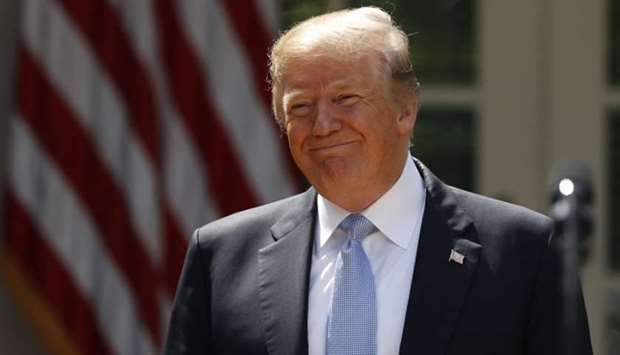US President Donald Trump yesterday slammed his ex-lawyer Michael Cohen, saying he may have acted illegally in secretly taping their discussion about payments to a former Playboy model over an alleged affair.
It was Trump’s first direct reaction to a report broken by the New York Times a day earlier which said the FBI had seized the recording during a raid on Cohen’s office earlier this year. Cohen has not yet been arrested or charged.
“Inconceivable that the government would break into a lawyer’s office (early in the morning) — almost unheard of,” Trump tweeted.
“Even more inconceivable that a lawyer would tape a client — totally unheard of & perhaps illegal.
“The good news is that your favourite President did nothing wrong!”
Former Playboy model Karen McDougal claims she had a months-long affair with Trump after they met in 2006.
The Wall Street Journal said the September 2016 conversation between Trump and Cohen was about buying the rights to McDougal’s story, which she had sold a month earlier to The National Enquirer for $150,000.
The tabloid ultimately sat on the story, preventing it from becoming public.
The chairman of its parent company, American Media, is a friend of Trump’s.
The reports raised questions about why Trump’s campaign denied knowledge of the deal between McDougal and American Media when it became public, and they fanned speculation about how much damage Cohen might be able to inflict on the president.
Trump’s current personal attorney, Rudy Giuliani, confirmed to the Times that the Cohen tape existed, but said it showed the president had done nothing wrong.
Regarding Trump’s claim of illegality, New York state law permits the recording of a phone call or an in-person conversation as long as one party consents, according to attorney John B Harris, who authored an article on the subject for the New York Legal Ethics Reporter.
Yet “it remains murky whether and when a New York lawyer can ethically tape without advance disclosure,” Harris said.
He cited two recent cases that show “despite the burgeoning use of surreptitious recordings by members of the public, there is little tolerance for lawyers who — albeit legally — surreptitiously record” other parties without justification.
Stephen Gillers, an authority of legal ethics and professor at New York University School of Law, told The American Lawyer in April that such recordings are “an issue on which the national profession has not come to common agreement.”
He argued that law firms should forbid the practice, except in certain narrow circumstances, and even then the decision should be taken by an ethics committee and justified in writing.
The FBI raided Cohen’s home and office in April on a referral from special counsel Robert Mueller, who is looking into Russian interference in the 2016 election and whether the Trump campaign colluded with Moscow.
The Justice Department says Cohen has been under investigation for months for criminal conduct largely centred on his personal business dealings.

Donald Trump (file picture)
